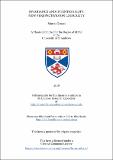Files in this item
Invariance and intensionality : new perspectives on logicality
Item metadata
| dc.contributor.advisor | Snedegar, Justin | |
| dc.contributor.author | Grossi, Marco | |
| dc.coverage.spatial | 109 p. | en_US |
| dc.date.accessioned | 2018-11-29T10:27:23Z | |
| dc.date.available | 2018-11-29T10:27:23Z | |
| dc.date.issued | 2018-12-07 | |
| dc.identifier.uri | https://hdl.handle.net/10023/16573 | |
| dc.description.abstract | What are logical notions? According to a very popular proposal, a logical notion is something invariant under some “transformation” of objects, usually permutations or isomorphisms. The first chapter is about extending “invariance” accounts of logicality to intensional notions, by asking for invariance under arbitrary permutations of both possible worlds and objects. I discuss the results one gets in this extended theory of invariance, and how to fix many technical issues. The second chapter is about setting out a better theory of logicality. I discuss the limits of invariance frameworks, and the need for a theory of logicality with a more solid philosophical ground. I believe that the concept of information can play a major role in defining what logic is and what logical notions are. I spell out this intuition, by designing a new test for logicality. A notion is logical iff it behaves in a certain way, by checking only “structural aspects of information”, and it does so under arbitrary transformations of its “informational inputs”. In the last chapter I explore some interesting features of my theory. I show how, contrary to standard invariance, in mine logical notions tend to stay persistent across different models of information. I also spell out an intermediate notion of quasi-logicality to make sense of the formality of “world-sensitive” notions: notions whose behaviour changes across worlds. I finally propose a case study: deontic modals. I discuss how one can argue for their quasi-logicality, in my framework. The dissertation is concluded with a technical appendix, in which I prove that my theory is a restriction of standard permutation invariance (at least for a class of items) when we model the space of information in a certain way: as a set of complete powersets of some sets. | en_US |
| dc.language.iso | en | en_US |
| dc.publisher | University of St Andrews | |
| dc.rights | Attribution-NonCommercial-NoDerivatives 4.0 International | * |
| dc.rights.uri | http://creativecommons.org/licenses/by-nc-nd/4.0/ | * |
| dc.subject | Logicality | en_US |
| dc.subject | Invariance | en_US |
| dc.subject | Tarski | en_US |
| dc.subject | Logical notions | en_US |
| dc.subject.lcc | BC135.G87 | |
| dc.subject.lcsh | Logic | en |
| dc.subject.lcsh | Semantics (Philosophy) | en |
| dc.title | Invariance and intensionality : new perspectives on logicality | en_US |
| dc.type | Thesis | en_US |
| dc.type.qualificationlevel | Masters | en_US |
| dc.type.qualificationname | MPhil Master of Philosophy | en_US |
| dc.publisher.institution | The University of St Andrews | en_US |
| dc.publisher.department | University of Stirling | en_US |
The following licence files are associated with this item:
This item appears in the following Collection(s)
Except where otherwise noted within the work, this item's licence for re-use is described as Attribution-NonCommercial-NoDerivatives 4.0 International
Items in the St Andrews Research Repository are protected by copyright, with all rights reserved, unless otherwise indicated.


